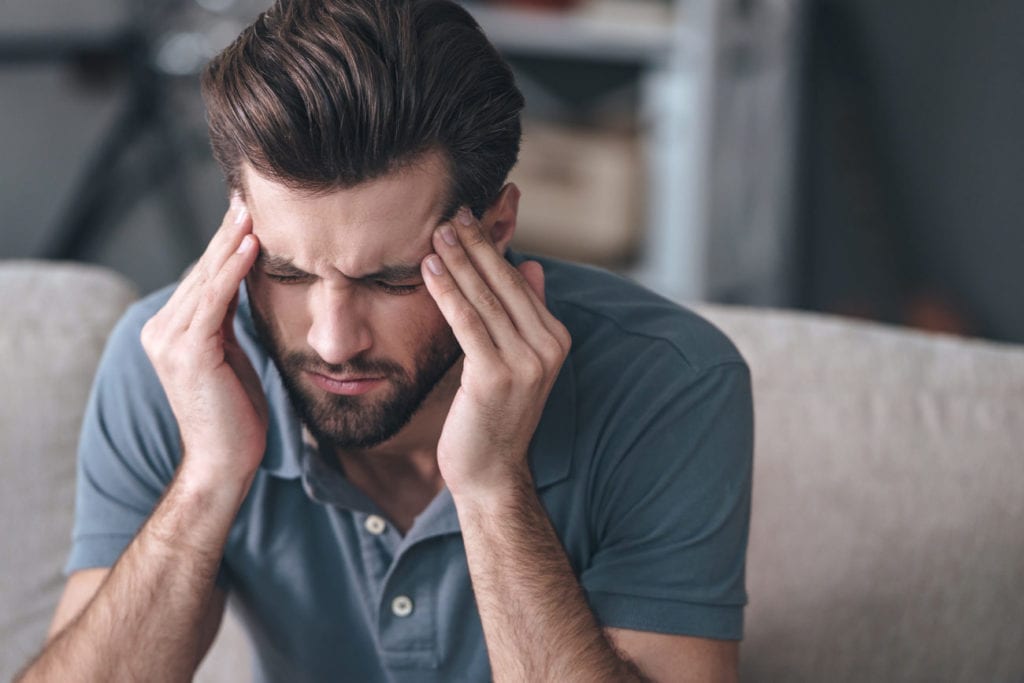Teeth grinding is a habit that can cause damage to your teeth, gums, and jaw joints. Also known as bruxism, the grinding of teeth affects the health and function of the temporomandibular joint (TMJ). The temporomandibular joint is the joint that connects your lower jaw to your skull.
Responsible for daily activities such as chewing, talking, and yawning, the health of the TMJ is essential for your overall oral health. When patients habitually grind or clench their teeth, it can cause stress to the joint and the attached muscles, often creating discomfort, chronic pain, and can lead to TMJ disorders.

Treatment for Teeth Grinding
Dr. Ali Sarkarzadeh offers patients oral sleep appliance mouthguards as part of TMJ treatment. There is no definitive treatment for bruxism, but this doesn’t mean you can’t alleviate the symptoms. Mouthguards protect your teeth and jaw from damage caused by overnight teeth grinding.
An oral sleep device is much like a custom-fit sports mouthguard. Patients will wear their mouthguard while sleeping to reposition the jaw into a more comfortable position. The oral sleep appliance is designed to prevent teeth from grinding. It also protects the teeth and jaws from developing complex TMD conditions.
Once your teeth grinding has been treated with an oral sleep appliance, Dr. Sarkarzadeh will focus on repairing any damage to the teeth. Grinding your teeth can often lead to worn down, chipped, and broken teeth. If severe enough, it can even damage the gums.
On the most extreme end, teeth grinding can cause damage to the bone structure of the jaw and even severe tooth damage or loss. Congressional Dental Care offers many restorative procedures such as dental implants, dental bridges, dental crowns, porcelain veneers, and tooth bonding to repair or replace teeth and give you back a healthy, functional, and beautiful smile.
Symptoms of Teeth Grinding
You may not be aware you are grinding or clenching your teeth. Patients commonly grind their teeth while they are sleeping or during times of stress. If you are experiencing chronic headaches, especially in the mornings or jaw pain, worn teeth, or broken teeth, it may be caused by nightly teeth grinding.
You can look for teeth that have chips or flat spots; these are a good indication that you are grinding your teeth in your sleep. For some, the symptoms of teeth grinding can begin to affect their quality of life causing chronic jaw and facial pain.
Signs of teeth grinding include:
- Worn teeth
- Dull teeth, because of worn tooth enamel
- Sensitive teeth
- Jaw or facial pain, “tired jaws”
- A broken filling and/or dental crown
- A chronic earache without an ear infection
- Chronic headaches
Teeth Grinding FAQs
Teeth grinding is a common dental concerns that can affect both children and adults. Understanding the causes of the grinding, symptoms, and treatments can help protect your teeth and overall oral health. Here, we answer some frequently asked questions to help you manage and prevent teeth grinding.
How do I know if I grind my teeth at night?
If you suspect you grind your teeth at night, there are a few signs to look out for. You might have jaw pain or soreness, headaches, or even worn-down or chipped teeth. We will assess your entire mouth at each regular dental appointment. Your dentist will let you know if you show any signs of grinding.
Can stress and anxiety cause teeth grinding?
Yes, stress and anxiety can be major contributors to teeth grinding. When you’re stressed or anxious, your jaw muscles may tighten, leading to grinding or clenching of your teeth. Managing stress and anxiety through relaxation techniques or professional help can often reduce teeth grinding and its associated symptoms.
Do children to grind their teeth?
Yes, it’s common for children to grind their teeth, especially during their early years. Teeth grinding can occur for various reasons, such as teething, stress, or misaligned teeth. However, most children outgrow this habit as they get older.
Is bruxism linked to sleep disorders?
Yes, bruxism is often linked to sleep disorders. Many people with bruxism also experience sleep apnea or snoring. The grinding and clenching of teeth can disrupt sleep and lead to daytime fatigue. Treating the underlying sleep disorder can reduce bruxism and improve overall sleep quality.
What vitamin deficiency causes teeth grinding?
Patients who have a vitamin deficiency in calcium or magnesium may be more prone to suffer from teeth grinding. Vitamin deficiency has been linked to frequent teeth grinding. A change in diet has been shown to help patients who grind their teeth and are vitamin deficient.
What causes grinding of teeth?
The most common reason people grind their teeth is stress and anxiety. Misaligned teeth may also cause a patient to grind or clench their teeth. Sleep apnea may also cause patients to grind their teeth at night.
Do essential oils help teeth grinding?
Essential oils have been shown to help patients with teeth grinding. The most effective so far have been lavender, roman chamomile, ylang-ylang, juniper berry, and peppermint.
Schedule A Dental Exam Today
If you believe that you are grinding your teeth or clenching your jaw, be sure to let Dr. Sarkarzadeh know during your next dental health exam. Stopping bruxism can help patients alleviate painful symptoms and protect the health of the teeth and gums.
Contact our Rockville, MD dentist office, or request an appointment online. We welcome new patients from Rockville, Bethesda, Silver Spring, Chevy Chase, Aspen Hill, Rollins Park, and all surrounding communities.
